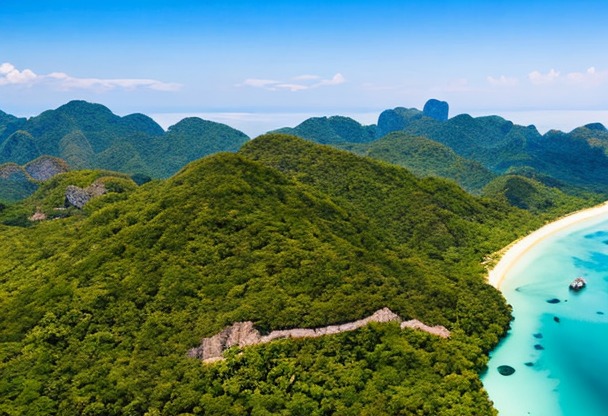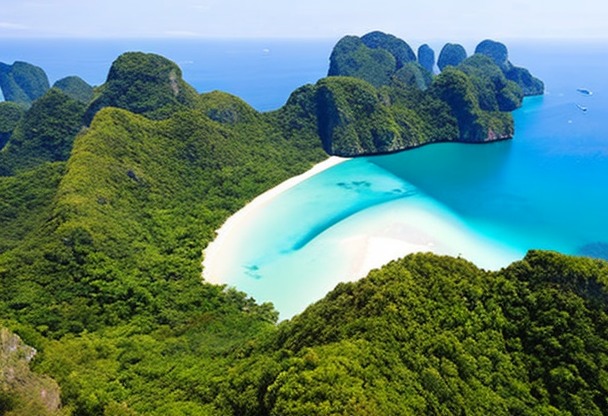Best time to travel to Thailand
Choosing the right period for your trip to Thailand can make all the difference. It's important to consider climatic elements, seasonal events and busy tourist periods to maximize your travel experience.

Location
Climate
When to go to Thailand: tourist seasons
There are two main seasons for visiting Thailand: summer and winter. dry season and the rainy season. Each of these seasons has its advantages and disadvantages in terms of weather, tourist numbers and prices. Here's an overview of the particularities of each season:Dry season: November to February
There dry season in Thailand runs from November to February. During this period, temperatures are pleasant (between 25 and 30°C), sunshine is at its peak and rainfall is rare. It's the best time to enjoy the country's paradisiacal beaches and a wide range of outdoor activities. The dry season also corresponds to the high tourist season, with generally higher accommodation prices and more visitors to tourist sites.Rainy season: May to October
There rainy season in Thailand extends from May to October. During this period, rainfall is frequent and sometimes intense, especially in September and October. Nevertheless, temperatures remain pleasant (between 25 and 30°C) and humidity is higher. The rainy season also corresponds to the low tourist season, which means that accommodation prices are generally lower and tourist sites less crowded. However, some activities may be compromised due to weather conditions.Major cultural events in Thailand
Throughout the year, Thailand hosts numerous cultural events that reflect its history, traditions and spirituality. Here are just a few of the must-see events:- Chiang Mai Lantern Festival Chiang Mai Lantern Festival: celebrated every November at the time of the full moon, this festival is an opportunity for the people of Chiang Mai to release thousands of lanterns into the sky to chase away evil spirits and attract good luck.
- Songkran Thai New Year, April 13-15. For three days, Thais visit temples to pray and sprinkle Buddha statues with perfumed water. At the same time, giant water fights are organized in the streets of towns and villages.
- Loy Krathong The traditional Thai festival is held on the full moon in November. Thais make small boats from banana leaves, decorate them with flowers, candles and incense, then let them float on the rivers to pay homage to the goddess of water.
Public holidays in Thailand
In addition to cultural events, several public holidays are celebrated in Thailand throughout the year. It may be worth planning your trip around these dates to take advantage of the local festivities:- April 6th Chakri Memorial Day, commemorating the founding of the Chakri dynasty.
- December 5th King's Day, in honor of King Bhumibol Adulyadej's birthday.
- August 10 Queen's Day, celebrated in honor of Queen Sirikit's birthday.
Low and high season in Thailand
As mentioned above, the low and high season periods in Thailand are mainly determined by weather conditions:- High season (dry season) From November to February. Accommodation prices are generally higher and tourist sites more crowded. It's advisable to book your accommodation in advance to benefit from the best rates and guarantee your place.
- Low season (rainy season) From May to October. Accommodation prices are generally lower and tourist sites less crowded. However, some activities may be compromised by weather conditions.
Insurance

Your credit card does not cover you in all situations, that is whyIt is essential to take out insurance before you leave to avoid any unpleasant surprises. If you need to see a doctor or be hospitalized, in some countries, medical costs are very high and you will then find yourself having to pay several thousand euros.
Our partner Chapka Insurance proposes the contract CAP ASSISTANCE 24/24 with many essential guarantees.


Flights

Your flight has been cancelled or delayed ?
You may be eligible for a compensation of up to €600 ! For this, lawyers are responsible for handling your claim with the airline and are only paid when the reimbursement is effective.
In conclusion, no financial risk for you, only advantages!
Immigration statistics in Thailand
In 2019, Thailand welcomed nearly 40 million international tourists, representing an increase of 4.2% over the previous year. This steady growth in tourism makes a major contribution to the country's economic development. Thailand is also a popular choice for many expatriates, with around 3 million foreigners living and working in the country.Origins of foreign visitors and residents
According to official data, the majority of international visitors to Thailand come from the China (27.5%), followed by neighboring ASEAN countries, such as China and India. Malaysia And Singapore. Other countries accounting for a significant share of tourism include South Korea, THE Japan, l'India and European countries such as United Kingdomthe France and theGermany. Among expatriates living in Thailand, there is a higher proportion of Europeans and Americans, as well as nationals from neighboring Asian countries such as Myanmar, Cambodia and Laos. The main reasons why these people choose Thailand as their home are professional opportunities, the affordable cost of living and quality of life.The most popular visas in Thailand
There are several types of visa available for entering and staying in Thailand, depending on the purpose of the trip and the length of stay. Here are the most popular visas:- Tourist visa This visa is intended for visitors wishing to spend a vacation in Thailand and stay for up to 60 days. It is possible to extend this visa for up to 30 additional days.
- Non-Immigrant Visa This type of visa is intended for people with a specific reason for visiting Thailand, such as work, study or family reunion. Validity varies from 90 days to one year, depending on the reason for entry and associated conditions.
- Retirement visa Also known as the "O-A" visa, this visa is intended for people aged 50 and over wishing to retire in Thailand. It is valid for one year and can be renewed annually.
- Business Visa For investors, entrepreneurs and employees of foreign companies, this visa allows you to work and reside in Thailand for up to one year.
Visa requirements
To obtain a Thai visa, certain conditions must be met, such as possession of a valid passport, proof of sufficient funds to cover the stay, and in some cases, a return or onward ticket. In addition, depending on the type of visa requested, additional documents may be required, such as a letter of invitation, a work contract, or a marriage certificate.International tourism figures for Thailand
Tourism plays a vital role in the Thai economy, accounting for around 20% of the country's GDP. In 2019, revenue generated by tourism reached nearly US$64 billion, an increase of 3.8% on the previous year.Tourist stays in Thailand
The average tourist stay in Thailand is around 10 days, with an average daily expenditure of US$47 per person. The country's main tourist destinations include Bangkok, Phuket, Chiang Mai, Pattaya and the southern islands of Koh Samui and Koh Phi Phi.Safety in Thailand
Thailand is generally considered a safe country for tourists and expatriates. However, it is important to take certain precautions to avoid potential problems, such as pickpocketing and scams. In addition, the Thai government implements strict measures to guarantee the safety of visitors, particularly with regard to road traffic and food controls.

